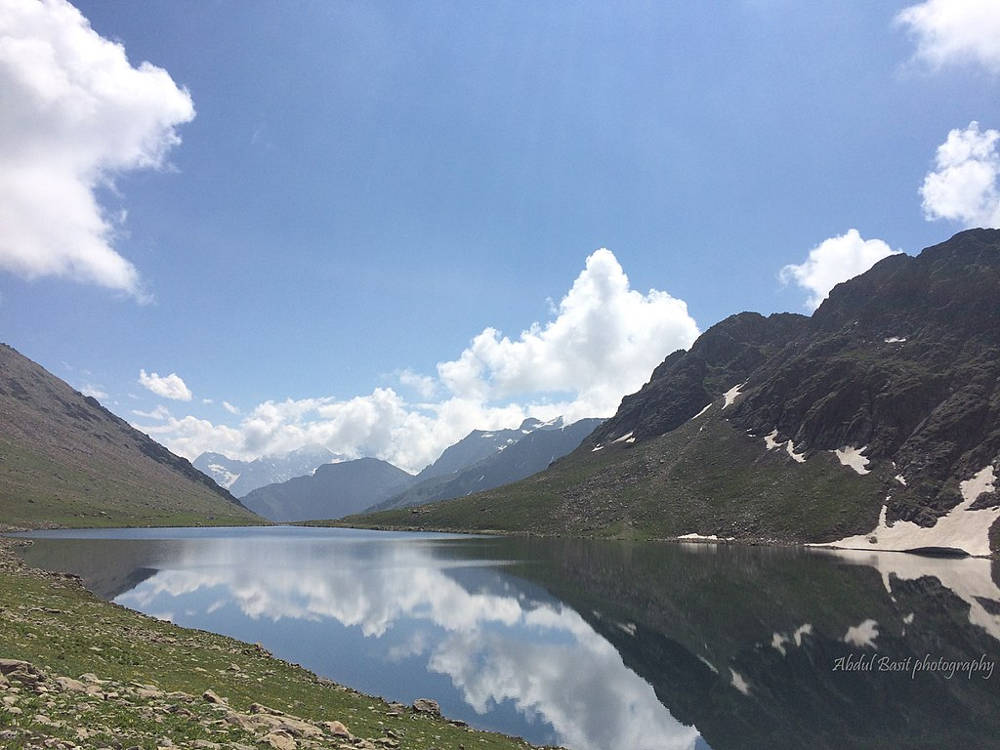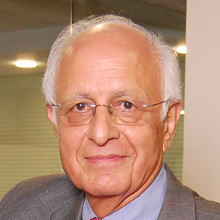[Image by Abdul Basit Dar / CC BY-SA]
Locked in by the pandemic, for 57 days and counting, I paced the balcony of my apartment—my daily, hour-long walk, to keep body and mind healthy. Neighbours in our apartment complex had been complaining on WhatsApp about our dictatorial management committee that was preventing them from walking in the lawns below. I reminded them of Nelson Mandela’s autobiography, Long Walk to Freedom, in which he writes that he walked back and forth in his tiny cell, for the 27 long years that he was in prison. He came out of his 27-year lockdown straight in body and clear in mind and then led South Africa through a remarkable renaissance.
Shama put the newspaper on the table. The headline jumped out at me. The government was easing the lockdown at last. I would be able to go out again. But, for what, my mind asked?
A new airline carry-on bag in its polythene wrapping was lying in my closet. I had planned three long journeys, within weeks, to Berlin, London, and New York, for important meetings. The day after I bought the bag, the Prime Minister announced the lockdown. I really didn’t need a new bag because I had a good one already with which I had travelled all over the world for many years. I had splurged on the expensive new one to give myself something to look forward to when I would be packing yet again for another long trip—travels I was beginning to tire of. The trips had to be cancelled in the circumstances. The bag was put away unopened.
A return to the old ‘normal’ seemed possible now, the newspaper’s headline suggested. Strangely, I felt sad, as if I had lost something. Poems can articulate feelings that the rational mind cannot explain in prose. Many poems came to my mind. They were poems I had written 32 years ago, on a hike to Tarsar Lake in Kashmir, where I had travelled for a few days to ‘get away from it all’.
The ‘it’ I wanted to get away from, was a very busy, though well balanced, social and work life in Mumbai; but balanced with too much on each side. I felt the need for a pause from the rushing around to meetings and parties. To catch my breath again.
I flew from Mumbai to Srinagar, and then to Pahalgam by car, where a guide met me and we set off upwards into the mountains, with our tents and provisions on the backs of mules. Walking through the mountains, beside a joyously free river, and then above the forest-line to pastures carpeted with wild flowers, we arrived late one evening at our highest camp-site. The next morning, the guide said, we would climb even higher to our destination, the pristine lake nestled amongst the peaks. And then return.
I turned into my sleeping bag, and shut the tent flaps tight, to keep the cold out, and dreamt of the lake, blue in the sun, that the brochure had promised. I was awakened at night by the sound of thunder, rain pounding on the tent, and flashes of lightning piercing the dark. In the morning, the guide stuck his head in, to say that we would be locked in until the rain ceased. And, if the rain did not stop within two hours, we would have to return without reaching our destination, so that we could get to Srinagar in time for my flight to Mumbai. And back to my busyness.
Then a miracle happened, and grace descended. I became no longer anxious about deadlines. It was like a ‘satori’—the flash of insight that Zen masters inspire—a sudden enlightenment. A poem emerged in my mind.
Peace
I planned the peak in the sun
I woke with rain on my tent
I switched off the engine
There was peace within
I had arrived at the destination, the purpose of my journey, which was to get away from it all. It was like ‘the peace that passeth all understanding’, as the Bible says.
Another miracle: in precisely two hours according to my watch, Nature became still. The guide said, let’s hurry.
We scrambled quickly up to the lake. There it was, a calm mirror of the sky. Blue, with little puffs of white clouds in it. Sky and lake merged at its farthest end into one expanse of blue and white; the water was a bit deeper blue though, and also reflected the wild flowers around it, so you knew which was which.
We had not encountered another human being in the previous two days, other than ourselves. Rushing down from the lake to reach our night camp, I met an old man walking up the path. I wrote another poem in my diary that night.
An Encounter with an Old Man in the Mountains
He asked me for alms; I couldn’t bring myself
To give him something he had not earned.
He asked for medicine; knowing not what
Ailed him I did not dare.
Then he asked for the time of day:
I looked into his eyes and saw God
Had given him seasons and aeons
While I had just my watch
To guide me on my way.
Poverty takes many forms. Amidst the material poverty which the old man endured, there was an abundance of wisdom. Spiritual wealth is what I had come to the mountains for. The lake, and the old man’s eyes, showed me the way.
In my mind, I had no time to waste. A world of deadlines. But towards what end, I asked myself? Another poem then.
Deadlines
Rushing through the Then What
To have lunch at one o’clock
And Then What?
This one, in sixteen syllables, was close to a standard Japanese haiku of seventeen syllables. I have learned since then, however, that haiku come in many forms. The point of a haiku is to convey the feeling of a moment, without being cramped by conventions.
Three days later, we came to the end of the trail, to meet the car to bring me back to civilization. Another car was parked alongside mine, with a young Indian couple beside it, evidently on their honeymoon one could see, by the way they were dressed and the coyness with which they held hands. They were looking up the mountain trail down which we came, to the mountain peaks above.
As I passed by, he asked, “What is up there?” I looked up to where he pointed, and explained, “Just mountains and a lake.”
In the car to Srinagar, I wrote my goodbye to all that.
What is there?
It’s now back to my must dos or else.
The descending path takes me to my
First rendezvous with people and time
How shall I keep my own peace within?
I tarry for driftwood in the stream
That finds its course through mighty mountains
Compelling it to turn at their will.
Yet it swishes and swirls, whoops and whirls.
It dances with happiness—the joy’s within.
------
My knees ached with the strain of tugging
My heart down from the mountain meadows.
Days of swirling streams, soaring snows.
Sunshine and serenity behind me.
From heaven to earth the path descended
To the beginning of the motor road
Which goes down further to where
Education and Industry uplift Mankind.
There they stood beside their car
He in Gucci pumps and she in high heeled shoes
Thus far these measures of Man’s progress
Could carry them. Must they go beyond?
He watched me come and unpleasant I appeared
With the grime on my face
But the smile in my eye and the Adidas on my feet
Made them feel we could talk.
He asked me as I passed, “Excuse me, but
Is there something special up there?”
Thirty years after my brief lockdown in the tent up in the mountains, another lockdown seems to be ending. Do I want to go back to the normal that the pandemic has disrupted? Will I travel with my new bag around the world as soon as I am free to?
I could not travel far during the lockdown, only walk back and forth in my balcony. But my mind was not locked in. In fact, not only did I participate in all the three international conferences I had planned to, and that too without packing my new travel bag. I have participated in many more without stepping out of my study. Smart telecommunications have kept me busier than ever before.
I wonder now. Has my smartphone released my mind, or has it trapped it further?
Another poem then, thirty years after Tarsar when the internet and the smartphone had not yet been invented. This time, I was in the hills beyond Mashobra, walking alone on a mountain path, with only the sound of wind in the pines stirring the silence, when my phone rang.
Connecting with whom and what?
Passing by
You smell my flowers
And pluck them
You drop them on the path
When your cell phone rings,
To die
Trampled underfoot.
Love my flowers,
Smell them, leave them.
Carry their fragile fragrance
Lingering in you
Till it fades.
Forget your phone.


